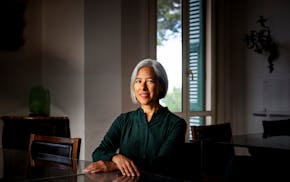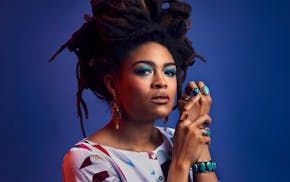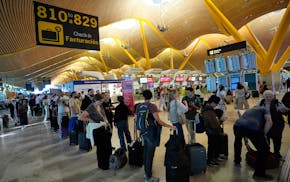In her "Meet Me at the Crossroads" Megan Giddings thanks people you'd expect a writer to acknowledge, including readers and University of Minnesota English department colleagues V.V. Ganeshananthan and Julie Schumacher. There's also at least one you might not expect: an Uber driver.
That driver, who drove the creative writing and literature professor to a New Orleans bar, claimed to be a psychic. She told Giddings personal things that left her shaken.
The psychic also gave Giddings the ending of "Crossroads," a speculative fiction novel about twins who are faced with the appearance of a mysterious door near their Michigan home (Giddings' editor compares it to Carl Sagan's bestselling "Contact"). Olivia passes through the door and possibly into another world. The other twin, Ayanna, spends years struggling with the disappearance of her sister.
Giddings, 40, and husband Jon Cameron live in Minneapolis. We chatted about her third novel (the others are "Lakewood," one of New York magazine's 10 best books of 2020, and "The Women Could Fly"). We began with that crazy car ride:
Q: No spoilers but the book ends with a scene in which Ayanna's ride-share driver conveys a key message to her. That happened in real life?
A: Yes. In New Orleans, this woman started telling me things, some a little vague and some uncomfortably like what was going on in my life at the time. She was a nurse and apparently a psychic — this is the most New Orleans thing I can think of — and she kept saying that someone had a message for me, someone from the other side. It was so unnerving.
Q: You knew right away you were going to use it?
A: I still have no idea how to interpret what went down but I realized, "This is the next book." There's only one other moment in my fiction that is drawn so directly from real life. But I knew, "This is something I'm going to use." It happened in 2021 and I was just finishing up "The Women Could Fly."
Q: You grabbed a notebook and started writing stuff down?
A: I posted about it on social media. I immediately told people at dinner about it. The other thing is my husband was in the Uber, too, and he was like, "What the [expletive]?" I was saying, "That really happened, didn't it? I didn't have some complete break from reality?" And he said, "Yeah, that was the craziest Uber ride I've ever had in my life." It's also the only Uber ride where the driver hugged me. I was crying. It was an emotional situation.
Q: Did you give a good tip?
A: Oh, 25% tip. Five stars. "Thank you for finishing my future book. Thank you for making me feel weird for three days."
Q: What did you want to accomplish with "Crossroads"?
A: I knew for a long time I wanted to write about two things. A number of my friends were having kids and were really worried about, "How do I teach my kid to be a good person? How do I give them a foundation of caring about other people?" Even my own roots — I was raised strictly Catholic and I have really mixed feelings about having faith now but I can see that there's where I learned even to want to care about other people, which is one thing I'm really grateful for.
Q: You said there were two things?
A: I was interested in writing about my fear of death and the unknown. I thought by the time I was 35 or 40 I would feel less lost, or the world would make more sense, but I think it's gotten even more inexplicable.
Q: The idea of being a good person really comes through. I counted 79 uses of the word "kindness" in the book.
A: It's been interesting to see it called a coming-of-age novel. I have some hesitations around that but if it's a coming-of-age novel about learning to be kind in an unkind world, and that's part of the progress to being an adult, that would make me really happy.
Q: That's probably even trickier for young people who are, like you, Black. The sisters in the book are Black, too, and its treatment of race feels very subtle. Can you speak about that?
A: I get a lot of pleasure out of them but a lot of the books that get published seem to be catered to the idea that the primary concern of being a Black person is being a Black person in a country that doesn't want Black people. They are important and necessary — I get sent so many books that are Black horror or speculative fiction that deal with repercussions of race. They're often very good. But I felt like there's not always room for fun or kindness or thinking deeply about living a long life.
Q: And we should say it is a really funny book. What was the hardest part to get right?
A: The ending. And, also, all of it.
Q: Say more about that, please.
A: A lot of books, especially around death or kindness themes, can be scolding. I felt like the book should feel comfortable, like you're being invited in to think about all of these things, so there were times I had to work really hard not to scold. I changed a lot of my diction to feel more informal and I tried to emphasize play, have jokes.
Q: You've said the writing of your books often overlaps. Did that happen here?
A: Very slowly. I'm doing research and writing very poorly. But it is nice to be thinking about the next one.
Q: And now you know that if you get stuck, all you have to do is go to New Orleans and hop in an Uber?
A: I'll email and let you know if she ever gives me a new book.
Meet Me at the Crossroads
By: Megan Giddings.
Publisher: Amistad, 310 pages.
Event: 7 p.m. June 3, Magers & Quinn, 3038 Hennepin Av., Mpls. Free but registration required.

National Book Award winner Susan Choi's new novel is 'Flashlight'

The Big Gigs: 10 top concerts to see in the Twin Cities this week

Travel Troubleshooter: Denied boarding in Spain, but Alaska Airlines won't refund me
Minneapolis writer Kathleen West's new novel is fun. Her mom approves.

